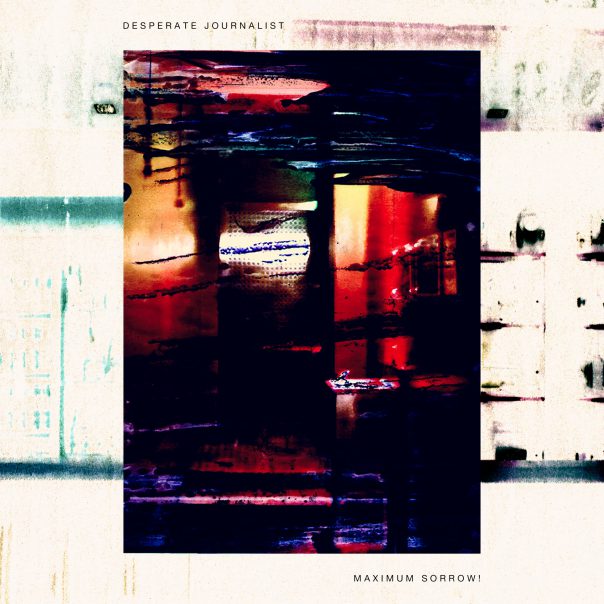REVIEW: Desperate Journalist gives maximum pleasure with ‘Maximum Sorrow!’

It’s telling that U.K. post-punk band Desperate Journalist takes its name from a joke—specifically, a track from a 1979 John Peel session with The Cure, “Desperate Journalist In Ongoing Meaningful Review Situation.” Dubbed “The Perfect Diss That Nobody Heard” by Vice in 2014, it’s basically two minutes and 40 seconds of Robert Smith mocking music writer Paul Morley and his condescending review of the band’s album Three Imaginary Boys.
Maximum Sorrow!
Desperate Journalist
Fierce Panda, July 2
9/10
A name like this tips you off that Desperate Journalist is spunkier and more self-aware than your average Goth-affiliated band. It’s as if frontwoman Jo Bevan and her bandmates are saying, “Yeah, we know we sound like Joy Division and Siouxsie and the Banshees and The Jesus and Mary Chain and all them. How brilliant. Is that the best you got?”
The band’s latest album, Maximum Sorrow! (another little wink, perhaps?), more than justifies such cheekiness. The music’s as anthemic and danceable as anything by the influences listed above. At the same time, the tart, tender lyrics place Bevan closer to Corin Tucker or Kathleen Hanna than to Robert Smith or Ian Curtis. Add it up and you have a release and a band that desperate journalists should be clamoring to cover (and that average U.S. listeners should be quick to embrace).
Maximum Sorrow! opens with “Formaldehyde,” a somber, solo-keyboard rumination on social conformity and existential meaninglessness. No surprising insights here, but Bevan’s clarion harmonies give the track some distinction. Indeed, her vocals are so striking—clear and pretty, yes, but you sense the iron fist in that velvet glove—that they contradict the song’s meaning. “When you are gone, will they forget your face?” she sings. Maybe, but Bevan’s voice will be hard to forget.
The second track, “Fault,” showcases the band in full Joy Division mode. Caroline Helbert’s drums skip and skitter beneath Simon Drowner’s propulsive bass and Rob Hardy’s ringing guitar as misty synthesizers swirl around them. Bevan’s plaintive wail and bitter words cut through the fog. She conveys both despair and rage when she hits the chorus: “If it’s no one’s fault, then it’s everyone’s fault.”
Next comes the swaggering “Personality Girlfriend.” The sarcasm glistens on Bevan’s voice as she promises a guy that she’ll “be well aware of the hand God dealt me” and “amuse you until the rot sets in.” Eventually, the yearning beneath the self-suppression breaks out as Bevan moans, “Please, will you love me?” The swinging beat and shrieking guitar offer the comfort and empathy that the young woman in the song desperately needs.
On “Armageddon,” Bevan taunts and entices an upper-class hipster (“So much self-loathing/ In your high-end, high street clothing”) as the world falls apart around them. The bass and drums rumble like tanks rolling over rubble. “Fine in the Family” rages against being stuck in a drab, conventional life (“I was just wondering if we could ever know anything else?”). As if to evoke the universe beyond the humdrum day-to-day, Hardy coaxes all manner of warped screeches and yowls out of his guitar.
Bevan decries a life of quiet desperation once more on “Utopia” as chiming guitar and glittering synthesizer conjure a vision of something grander. In case these two songs weren’t enough to get the message across, “Everything You Wanted” sets it to Helbert’s spry disco beat. Bevan’s voice floats above Drowner’s and Hardy’s chugging riffs like an angel peering down on us poor mortals.
Up next is the galloping “Poison Pen,” which might take the prize for best lyrics on the album. Bevan skewers a pompous white male novelist so mercilessly that you picture Henry James and Hemingway wincing in their graves (bonus points for squeezing in “sesquipedalian”). “The Victim” addresses a rudderless ex just as piercingly but not unkindly. On “What You’re Scared Of,” Bevan coos of loss and betrayal while Hardy’s guitar snarls and the rhythm section oozes along.
Maximum Sorrow! ends with the rueful “Was It Worth It.” Bevan reflects on the search for love and identity in London and asks herself the title question. As the band surges majestically behind her, the listener can’t help but look back on the album and answer, “yes.”
Follow reporter Ben Shultz at Instagram.com/benjamin.schultz1.
